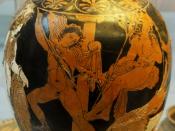Oedipus the Blind
In Sophocles' play, Oedipus the King, one of the main themes is blindness. Not just physical blindness, but intellectual blindness as well. The blindness issue is an effective contrasting method for Oedipus at different points in the play. Simply saying "blindness", however, is a little uncertain. It can be broken down into two components, Oedipus's ability to "see" and his willingness to "see".
In the beginning of the play, Oedipus has perfect physical vision. However, he is blind and ignorant to the truth about himself and his past. "Why are your eyes so cold?" (307). He desperately wants to know, to see, but he cannot. At this point, it is obvious what Oedipus's action must be; that is to overcome the blindness. " If you could only see / The nature of your own feelings..." (323-324). Ironically, into the play is introduced a prophet, Teiresias, who is physically blind, but who is clairvoyant.
This just reaffirms Oedipus as a man ignorant to the true appearance of things - this blind man can "see" the truth about Oedipus, yet Oedipus, in all of his physical exactness, cannot. Toward the end of the play, it is shown how Oedipus learns the true nature of things - his past is revealed to him and he learns that the oracle was correct. Now Oedipus can see all to clearly what the truth is, but he desperately does not want to accept his fate. So, in response, Oedipus commits an act of avoidance; he blinds himself so that he may not see. Unfortunately, this does not help his problem. Perhaps it was an act of cowardice because he didn't want to accept the situation the way he "saw" it, and decided instead not to see it at all.
The final speech...


